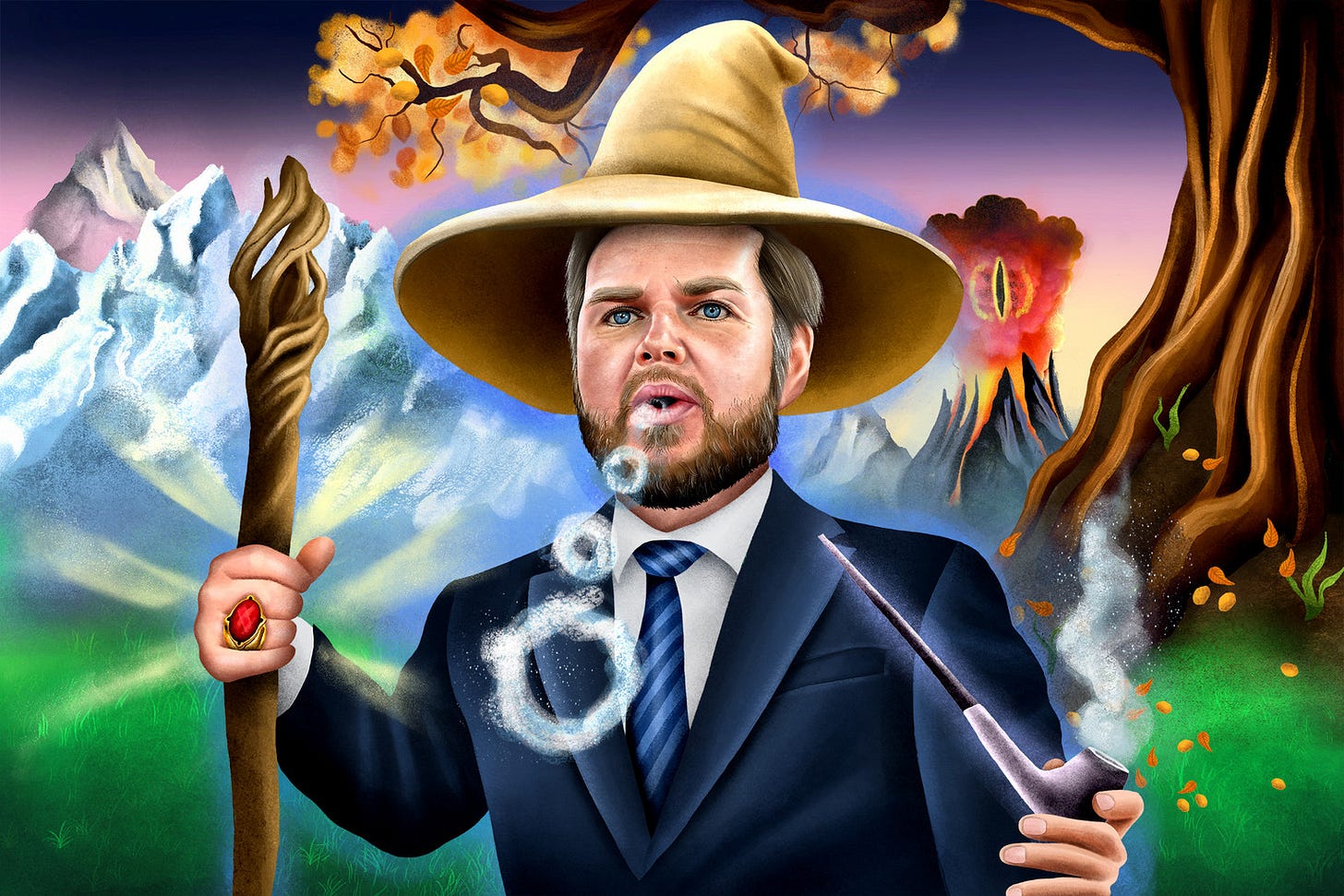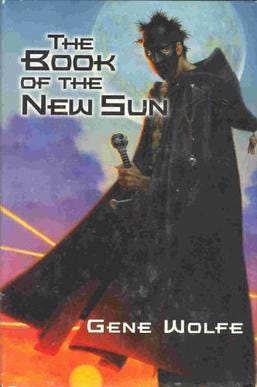The Order of the Seekers for Truth and Penitence
In light of recent events, we will be replacing Lord of the Rings as the definitive Catholic fantasy epic.
“It has been remarked thousands of times that Christ died under torture. Many of us have read so often that he was a "humble carpenter" that we feel a little surge of nausea on seeing the words yet again. But no one ever seems to notice that the instruments of torture were wood, nails, and a hammer; that the man who built the cross was undoubtedly a carpenter too; that the man who hammered in the nails was as much a carpenter as a soldier, as much a carpenter as a torturer. Very few even have seemed to have noticed that although Christ was a "humble carpenter," the only object we are specifically told he made was not a table or a chair, but a whip.”
-Gene Wolfe
Everything appears to be going great for Republican vice presidential candidate, Catholic convert, and The Man Who Ate Thursday, JD Vance. Less than two weeks into his candidacy, the AP ran - and then later deleted, after realizing how stupid it sounded - a piece with the headline “No, JD Vance did not have sex with a couch”, responding to a deadpan joke on Twitter that had gained a lot of traction. The next day, Donald Trump called into Fox and Friends to explain that he definitely didn't regret picking Vance as his running mate, which is the message you want to be delivering publicly ten days after you picked the guy. At the time of this writing, a different internet goof-em-up was gaining traction, this time about Vance having a fetish for anthropomorphic dolphin-women. While Vance is obviously off to a strong start, it remains to be seen how much of an electoral boost the Republican ticket can get with a VP candidate holding the first post-convention negative net favorability since my dad was in college, a VP candidate who ran ten points behind the other Republicans in his state in 2022, and a VP candidate who is incapable of talking to or about women without sounding like the bad guy in the 1996 Disney animated adaptation of The Hunchback of Notre Dame.
But there's another Vance issue that requires our immediate attention: he's a Tolkien dork.
Vance has never made a secret of this, but Politico ran a story on his fandom on July 19th, and chose to use the incredible illustration above for their header. Vance has connections to, by my count, at least four venture capital firms named after Tolkien knicknacks (Palantir, Mithril, Nayra, Anduril), which, if you were somehow able to forget everything else you know about Vance, would still make him one of the most repellent people you've ever heard of. Vance himself says that “a lot of my conservative worldview was influenced by Tolkien growing up,” and, according to DC think tank dork and Tolkien dork John Shelton, Vance is specifically Gandalf in the epic’s political allegory:
“Gandalf, unlike the other great powers in Lord of the Rings, cared for the hobbits and other lowly people of Middle-Earth, and so it is unsurprising that Vance would see himself as a kind of Gandalf, caring for the forgotten people of his hometown, keeping a watchful eye on them against the corrupting effects of the world.”
But is Vance really Gandalf, especially given that the thesis of his book came across as “I hate the filthy poor people I grew up with”? Not only do I see him more as a Shelob figure, but another Catholic weighed in for the political piece, suggesting that Vance was a different Tolkien character. Folks, it's the one and only Rod Dreher:
“[Vance] is thinking broadly about how all must join in the great struggle against darkness — there is no avoiding the struggle — and how God can use the humble and the lowborn to do great things…Who would have imagined that sad, scared little Ohio boy living in a wreck of a family would have come through it all, and risen to the gates of supreme political power? What might God be doing with him? J.D. Vance might be Frodo of the Hollers, a veritable hillbilly hobbit.”
Ugh, okay, whatever, so he’s not Gandalf, he’s Frodo, even though Frodo, of course, does not end his story at “the gates of supreme political power”. Frodo and Gandalf are good characters, and The Lord of the Rings is a good story, but mapping the allegory to the Trump-Vance ticket doesn’t work. For one thing, Frodo is a reluctant hero, one who deliberately doesn’t seek out power or, say, sacrifice everything he appears to believe so he can win elected office, and he very famously does not have the courage and strength to save the day. The One Ring doesn’t get destroyed because a masculine muscular (non-couch-fucking) Frodo goes on the hero’s journey; Frodo couldn’t throw the One Ring in Mount Doom when push came to shove, he loved the power too much. The One Ring got destroyed anyways because Frodo’s cowardice and Gollum’s greed got cooked in the crucible of the mercy that Frodo had shown Gollum earlier, leading to the One Ring’s destruction in a way that neither of them could have comprehended. Something far more profound than their stupid squabbles and struggles, something far beyond their understanding, was at play at the end of The Lord of the Rings. Vance isn’t Frodo because Vance is seeking out power, seeking it out with a man who is desperate for it. Vance - like any other candidate on a presidential ticket - is trying to make himself the main character of history, something Frodo would never have sought out. So when conservative dipshits say their worldview is influenced by Tolkien, or see Frodo in a man like JD Vance, they're missing some of the deeper messages of Tolkien and then also missing the not-deep, explicitly stated plot of the book. Vance is also not Gandalf because Gandalf was intelligent and charismatic.
Also in the Politico piece, you can find a quote from Pepperdine professor Jessica Hooten Wilson, who points out that “this is where Tolkien did not want his work called allegory because he didn’t want one way of reading his text. I would also hope that whoever is reading the Lord of the Rings and Walker Percy is willing to learn from it rather than to make it say what they want it to say,” and that seems to be what’s happening with Vance. There was also a very good piece last week in Religion News Service by Southern Baptist religion writer Karen Swallow Prior on Vance’s misuse of Tolkien:
““The Lord of the Rings” is often read by either side of the political aisle as advancing that side’s own view. For if the world is a black and white battle between good and evil, then surely one’s own side is good and the other evil…While there is some element of Tolkien’s Catholic faith that might justly be called conservative, there is little, traditionally, in it that would find expression in a movement encapsulated in the phrase “Make America Great Again.” Hobbits, after all, are the antithesis of “greatness” in Tolkien’s Middle-earth. “Make America Great Again” tells a story that is rooted in an idealized version — a bad fantasy — of good versus evil. Good and evil certainly exist. Spiritual realities — both within and around us — play a part in these battles, to be sure. Yet, most of our everyday battles in ordinary life — including national elections and politics — consist not of Sauron versus Frodo, but rather of complicated people, situations and issues that are mixtures of good and bad. Complex people and their stories require the nuance of an expansive language to understand and tell. Indeed, Tolkien himself argued that “Fantasy is a thing best left to words, to true literature.””
Vance isn’t the first Catholic to read himself, or the people he likes, into Tolkien and assume they are all joined in a epic, clearly-defined battle of good and evil. No less an intellectual titan that Dr. Taylor Alison Marshall does this all the time. I still remember Donald Trump leaving Walter Reed Hospital after recovering from COVID and Marshall posting that photo with “I am Donald the White, and I come to you now, at the turn of the tide.” I remember Marshall reacting to Pope Francis’ promulgation of Traditionis Custodes with a gif of King Theoden saying “So it begins…”1. I remember thinking, on both occasions, “we need to retire Lord of the Rings”.
And we do, we need to retire it as the definitive Catholic fantasy epic. It served us well, we can hang its number up in the rafters, but it’s time to move on to a new fantasy epic. And it’s not just because assholes read it and love it - I personally know several non-asshole Tolkien fans - but it’s because if we’re using Lord of the Rings to inform our Catholic worldview - especially in a setting like 2024 America - it’s not going to work. The world doesn’t feel like Tolkien. We’ve talked about this before, but living as a Catholic does not feel like living in a Tolkienesque high fantasy epic, life is a lot more boring than that. There are not quests and last stands so much as there are masses of noise and confusion, suffocating boredom and occasional terror, a struggle to decide whether we should act as though life matters or give in to the angry bravo, and, most importantly, an occasional fleeting chance to give mercy and relief to the person next to us, in an otherwise unforgiving world. We need a Catholic fantasy epic that feels like that, and we need that epic to occupy the same place in Catholic culture that Lord of the Rings has for decades. To that I say: please allow me to introduce my friends in the Order of the Seekers for Truth and Penitence.
The Book of the New Sun, published in four volumes from 1980 to 19832, is the magnum opus of Catholic speculative science fiction writer Gene Wolfe, who wrote the entire thing in his free time while working at a suburban Chicago-based engineering trade publication. Wolfe's writing will never be adapted into an epic film trilogy or reach as many people as Tolkien has, but every respected sci-fi and fantasy author - Ursula K. LeGuin, Neil Gaiman, Harlan Ellison, and others - has universally acclaimed Wolfe as one of the best to ever do it. The first three volumes of New Sun have each won two major science fiction book awards, cementing Wolfe as one of the most decorated science fiction writers of all time; the fourth volume won only one, so maybe he was slacking off or something and only walked away with one medal that most genre writers spend their entire lives dreaming about.
Now, let's be up front about this: The Book of the New Sun is not going to be for everyone, and is an incredibly difficult and dense read, for reasons you're about to see in a minute. It is the only book I've ever read in my life where I needed a chapter-by-chapter podcast to help me navigate all of the references and allusions and callbacks3. But this book feels like Catholicism to me, today, right now. I would argue that Wolfe provides a more useful framework for navigating this era of history as a Catholic than Tolkien does.
Let's start with an extremely basic read of the plot: the narrator of New Sun is Severian, a young adult journeyman in the aforementioned Order of the Seekers for Truth and Penitence. Except the Order is just a nice-sounding name for a guild of torturers, charged with dealing out the horrifying punishments of this continent's autocratic ruler. Early in the story, Severian falls for one of his “clients”, and slips her a knife, allowing her to kill herself and avoid further torment. This act of mercy gets Severian exiled from his guild, and he begins a long journey across the continent, meeting all sorts of colorful characters and getting tossed about by various wild events along the way, before eventually, as he puts it, backing his way into the throne and becoming the all-powerful Autarch himself. The end, there you go.
It's insanely more complicated than that, and the rest of my description will be sadly inadequate. The Book of the New Sun is set on our world, but thousands of years - possibly tens of thousands of years - into the future, and nobody acts like it. Fights are settled with swords and axes - and, in one famous scene, throwing the petals of a poisonous flower - except occasionally somebody pulls out a ray gun. Early in the novel, Severian stumbles upon an old, yellowed photo in an archive, from an era that nobody remembers, an era so old it’s beyond recorded history or even mythology: as he describes it, it becomes clear to the reader that it’s a photograph of Neil Armstrong on the moon. Futuristic, majestic cities are fossils, three layers deep in the strata of Earth. As the novel goes on, you learn that humanity had once mastered interstellar travel but has abandoned it. You slowly piece together that certain characters have been aliens or cyborgs this whole time. There’s a giant kraken-like creature in the ocean, which is possibly from another world. The Autarch is at war with the continent to the north for some unknown reason. Severian’s client and lover was connected to a revolutionary building up for a war against the Autarch. All of these giant, epoch-defining events are mentioned only in passing as Severian recounts his own personal journey and encounters, and the different pieces of context and fragments of major storylines fold in on each other throughout the novel, overwhelming the reader and Severian, as, with every page, something new starts and nothing ever ends.
Complicating things further is that Severian is an extremely unreliable narrator, and at certain key points in the story, he’s clearly lying outright or omitting important things. Severian is narrating as the Autarch, explaining how he came to be on the throne, so what you’re actually reading is a piece of political propaganda by an autocratic ruler trying to sound cool and good, which will obviously affect how you take in the narrative by a man who reveals himself to be dishonest, spiteful, and misogynistic. And then compounding that is that Gene Wolfe adds commentary, as himself, to the end of each volume, explaining the hurdles he faced in “translating” this found document into our language, which is, again, from tens of thousands of years in the future, and again, made up by Gene Wolfe, who jammed it full of words none of us have ever heard, none of which are neologisms but rather archaisms that “Wolfe” “says” best “approximates” the animals and plants and buildings and equipment in Severian's world.
But New Sun is a Catholic story through and through. Gene Wolfe jams in dense references to everything - literature, music theory, horticulture, linguistics, history, mechanical engineering - on every page, but the references are never as haunting or explicit as when he draws from Catholic rituals. The first chronological event of the first volume is Severian going for a swim in the river, almost drowning, and emerging from the water to begin his story. As Severian completes his apprenticeship and begins his life as a journeyman torturer, his guild leader anoints him with stage blood, referring to it as “chrism”. Severian eventually takes on the consciousness and memories of a deceased character by participating in a dark ritual in which he literally eats part of the decedent’s body. Hey, wait a second, were all of those clearly the three Sacraments of Initiation? They sure were, and as Severian dons his fuligin cloak - the color darker than black - and slings his cross-shaped sword, Terminus Est, over his shoulder, and reflects on this world’s trinitarian God - the Pancreator, the Conciliator, and the Increate - you start wondering what the Catholic church would look like after ossifying for another thirty thousand years, and you start wondering how crazy it really would be if it just turned into a small isolated guild of men, dressed in black, charged with torturing others, and barely understanding the world around them.
Through it all, in this crowded and cluttered world, nothing has replaced encounter, and nothing has replaced mercy. Severian carries every person he meets on the road with him - in some cases, extremely literally - and ultimately, the moments that drive the plot are not the big wars or the political intrigue, but the moments of mercy, the moments when Severian could have hurt or killed someone and instead acted counter to his instincts. Tolkien, of course, was saying the same thing in Lord of the Rings. But my book is cooler and JD Vance doesn’t drool over it.
We need fewer Tolkien Catholics and more Gene Wolfe Catholics. I am literally the only person brave enough to say this. If you become a Tolkien Catholic, you run the risk of thinking that God has chosen you to do something great, that you are at the center of the story, that you need to form your fellowship and begin your journey to vanquish Sauron, however you define that. In the bleakest, darkest version of that scenario, you decide to enter American politics because of what you learned from Tolkien, you read a story about powerlessness and decide that you need to build up power for yourself, power like all the cool swords and big trees in the book. It is only once you become a Gene Wolfe Catholic, and try and fumble your way through all of the allusions and references and the different parts of the world that snap into place way later than you’d expect, that you get closer to the truth: that there’s a bunch of crazy shit happening around you at all times that you barely comprehend, that you live in a world trying to teach everyone to torture each other, and that the only thing you will be remembered for is whether you showed mercy to the person who begged it from you. I will never be Aragorn, or Gandalf, or even Frodo. None of us should assume we are any of those characters. We are all Severian.
Because Twitter/X's interface has deteriorated so much in the last two years, I can't find these two tweets anymore, and it's possible they're no longer up. I'm sure you don't need a lot of convincing that these are real things that Marshall said.
The four volumes were titled The Shadow of the Torturer, The Claw of the Conciliator, The Sword of the Lictor, and The Citadel of the Autarch. While single-volume versions of the full book were also published and printed, the most common format I see for the full work is a two-volume set, with the two volumes titled Shadow and Claw and Sword and Citadel.
That would be the delightful literary nerd hangout podcast Alzabo Soup.






